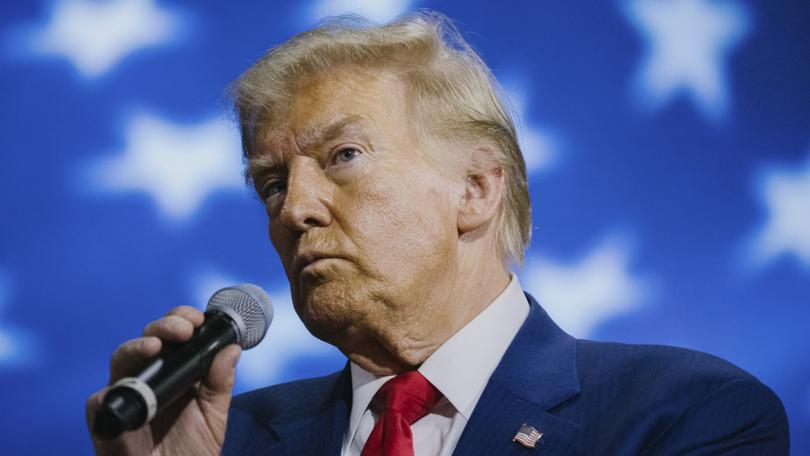THE NEW YORK TIMES: Donald Trump escalates threats to political opponents he deems the ‘enemy’
With three weeks left before Election Day, former President Donald Trump has a menacing political threat: that he would use the power of the presidency to crush those who disagree with him.

With three weeks left before Election Day, former President Donald Trump is pushing to the forefront of his campaign a menacing political threat: that he would use the power of the presidency to crush those who disagree with him.
In a Fox News interview Sunday, Trump framed Democrats as a pernicious “enemy from within” that would cause chaos on Election Day that he speculated the National Guard might need to handle.
A day later, he closed his remarks to a crowd at what was billed as a town hall in Pennsylvania with a stark message about his political opponents.
Sign up to The Nightly's newsletters.
Get the first look at the digital newspaper, curated daily stories and breaking headlines delivered to your inbox.
By continuing you agree to our Terms and Privacy Policy.“They are so bad and frankly, they’re evil,” Trump said.
“They’re evil. What they’ve done, they’ve weaponized, they’ve weaponized our elections. They’ve done things that nobody thought was even possible.”
And on Tuesday, he once again refused to commit to a peaceful transfer of power when pressed by an interviewer at an economic forum in Chicago.
With early voting underway in key battlegrounds, the race for the White House is moving toward Election Day in an extraordinary and sobering fashion.
Trump has long flirted with, if not openly endorsed, anti-democratic tendencies with his continued refusal to accept the results of the 2020 election, embrace of conspiracy theories of large-scale voter fraud and accusations that the justice system is being weaponized against him. He has praised leaders including Russian President Vladimir Putin and Hungarian Prime Minister Viktor Orban for being authoritarian strongmen.

But never before has a presidential nominee — let alone a former president — openly suggested turning the military on U.S. citizens simply because they oppose his candidacy. As he escalates his threats of political retribution, Trump is offering voters the choice of a very different, and far less democratic, form of American government.
“There is not a case in American history where a presidential candidate has run for office on a promise that they would exact retribution against anyone they perceive as not supporting them in the campaign,” said Ian Bassin, a former associate White House counsel under Barack Obama who leads the advocacy group Protect Democracy.
“It’s so fundamentally, outrageously beyond the pale of how this country has worked that it’s hard to articulate how insane it is.”
As they move into what will be their closing arguments to voters, Trump and Harris are devoting most of their attention to wrangling over the issues that remain voters’ top priorities — the economy, abortion rights, housing costs, and American engagement in the wars roiling Ukraine and the Middle East. The race remains tight, with views about Trump deeply cemented for most voters.
But the Harris campaign sees fresh political opportunities in Trump’s latest attacks on democratic principles, particularly among moderate Republicans and independents who disapprove of the former president’s character and polarizing style.
As Trump spoke Monday night, Harris stood in a stadium at the opposite end of Pennsylvania where she took the unusual step of playing an extended video montage of Trump vowing to go after those who oppose him. It included his recent comments about the possibility of military action against the “enemy within.”
“He’s talking about, he considers anyone who doesn’t support him or will not bend to his will an enemy of our country,” she told several thousand supporters at a rally in Erie, Pennsylvania. “He is saying that he would use the military to go after them.”

Harris’ full-throated attacks on Trump are a notable break from her previous efforts to minimize him as a vestige of the past. Her aides believe voters are still not familiar with Trump’s statements, nor do they fully understand the stakes for American democracy.
The campaign plans to integrate the video of Trump’s remarks — which it quickly turned into a television ad — into future rallies. Harris told aides after Monday night’s event that using the video footage to make her case against Trump reminded her of presenting evidence at trial.
Some who have publicly opposed Trump’s return to power are preparing for him to keep his promises. Gen. Mark Milley, who served as chair of the Joint Chiefs of Staff during Trump’s administration, told journalist Bob Woodward that he feared being recalled to uniform to be court-martialed “for disloyalty” should Trump win reelection. After criticizing Trump in a pointed retirement speech, Milley told Woodward that he installed bulletproof glass and blastproof curtains at his home.
Olivia Troye, who was Vice President Mike Pence’s homeland security adviser before becoming a prominent surrogate for the Harris campaign, said in an interview that her fears about a second Trump administration included prosecutions and a possible threat to her family’s physical security.
She worries that her husband could lose his job, and that Trump could pardon Jan. 6 rioters and they could target her. She even paused plans to adopt a child because she fears the environment for her family has become too dangerous.
“I have certainly considered what my options are in terms of citizenship in other places,” she said. “We are preparing for the worst-case scenario.”
Such threats of vengeance from Trump are hardly new: He has been talking about punishing his political adversaries since his 2016 run, when he repeatedly insisted that his opponent, Hillary Clinton, should go to jail and he encouraged crowds to chant “lock her up” at his rallies. Since his defeat in 2020, he has refused to accept that result, continuing to peddle false claims about election fraud.
And he has woven vows of retribution throughout his third campaign, promising to avenge what he sees as his wronged supporters.
“In 2016, I declared, ‘I am your voice,’” Trump told a crowd of conservative activists in March 2023. “Today, I add: I am your warrior. I am your justice. And for those who have been wronged and betrayed, I am your retribution.”
He toned down his rhetoric for a brief period before winning the Iowa caucuses in a landslide. But he quickly revived threats for revenge prosecutions and other retaliatory measures after being convinced of 34 felony counts by a New York jury in late May, saying, “Sometimes revenge can be justified.” In June, he took another tack: “My retribution will be success.”
Trump’s advisers would prefer that he focused on the economy and immigration, believing these issues will give him the edge with undecided voters who may be otherwise turned off by his menacing message.
But even in ostensibly policy-focused speeches or in town halls where he is meant to directly respond to voter concerns around pocketbook issues or public safety, Trump tends to return to the same grievances that have animated his political campaign this year.
At rallies, he has tried to volley Democrats’ attacks back at them, accusing President Joe Biden of being a threat to democracy when he was still the nominee, and then suggesting Harris had orchestrated a “coup” when she replaced Biden on the ticket. At his town hall on Monday, Trump — whose vehement election denialism spurred some of his supporters to storm the Capitol on Jan. 6, 2021, and disrupt the peaceful transfer of power — argued that Biden’s exit from the race amounted to the “overthrow of an American president.”
Trump treated the Jan. 6 riot as largely a harmless protest, downplaying the size of the mob of his supporters and their violent intent.
“You had a peaceful transfer of power,” Trump said, citing Inauguration Day, when he “left the morning that I was supposed to leave,” as proof of “a very peaceful transfer.”
Notably, many of the business and civic leaders seated in the ballroom in Chicago applauded. And there are signs that voters and even some prominent elected officials simply do not believe that Trump will make good on his most alarming threats.
When Virginia Gov. Glenn Youngkin, a Republican, was asked about Trump’s “enemy within” remarks during an interview with the CNN host Jake Tapper on Monday, he argued that the former president was referring to immigrants who entered the country illegally.
After being asked about Trump’s suggestion of turning the military against Americans, Youngkin replied that he didn’t believe that was what the president was saying. The network, he said, was “misinterpreting and misrepresenting his thoughts.”
“I’m literally reading his quotes to you,” Tapper replied.
This article originally appeared in The New York Times.
© 2024 The New York Times Company
Originally published on The New York Times
